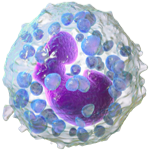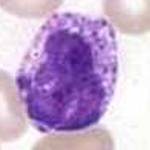immunology wars
may your immune system defend you
Basophils

Basophils are a granular, bone-marrow derived leukocyte that are closely related to mast cells. Whereas mast cells are found in the tissues, the basophils circulate round the body and release histamine when activated, resulting in the signs of inflammation and allowing other cells of the immune system to be recruited to the site of damage or infection.
Basophils also release cytokines that can stimulate the production of a type of antibody called IgE as well as drive CD4+ T-lymphocytes towards a Th2 response. IgE and the Th2 responses have been implicated in the immune defence against parasitic infections, including ticks and worms, but has also be linked to allergic diseases, such as asthma and hay fever.

Source: Blausen Medical (CC)

Source: Guy Waterval (CC)
A low level of basophils, known as basopenia, has been linked to autoimmune urticaria, a chronic condition that causes hives and itching on the skin.
Cells
- Basophils
- Eosinophils
- Mast Cells
- Neutrophils
- Monocytes / Macrophages
- Natural Killer Cells
- Dendritic Cells
- B-Lymphocytes
- T-Lymphocytes
- CD4+ T-Lymphocytes
- CD8+ T-Lymphocytes
- Regulatory T-lymphocytes
- Th17 Lymphocytes
